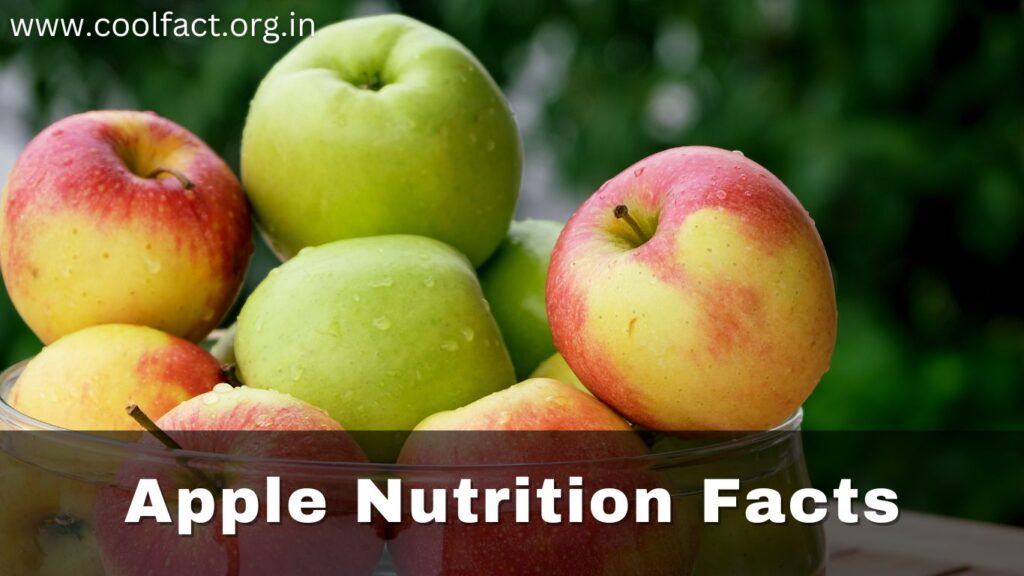Apple Nutrition Facts: Apples are one of the most popular and nutritious fruits globally, known for their crisp texture, juicy flavour, and abundant health benefits. From a symbol of good health to a versatile ingredient in countless recipes, apples truly live up to the adage: “An apple a day keeps the doctor away.” Packed with fibre, vitamins, and antioxidants, apples are a must-have in your daily diet. This article explores the incredible nutrition profile of apples, science-backed health benefits, and exciting ways to enjoy them in your meals.

Nutritional Value of Apple (Per 100g)
| Nutrient | Amount |
|---|---|
| Calories | 52 kcal |
| Carbohydrates | 14 g |
| Protein | 0.3 g |
| Fat | 0.2 g |
| Dietary Fiber | 2.4 g |
| Vitamin C | 8% of Daily Value |
| Potassium | 107 mg |
| Vitamin A | 1% of Daily Value |
| Calcium | 6 mg |
| Iron | 0.1 mg |
3 Science-Backed Reasons to Highlight the Importance of Protein
- Essential for Muscle Repair and Growth
Though apples are not a primary source of protein, incorporating them into a protein-rich diet can provide essential nutrients that complement muscle repair and growth. Combining apples with nuts or yoghurt amplifies their health benefits. - Protein Supports Metabolism
Protein plays a critical role in metabolic functions. Pairing apples with high-protein snacks like peanut butter or cheese keeps you full for longer and aids weight management. - Aids in Enzyme Production
Proteins are necessary for the production of enzymes that drive vital bodily processes. Adding protein-rich toppings to your apple dishes ensures optimal enzyme activity for better digestion and overall health.
10 Health Benefits of Apples (Apple Nutrition Facts)
- Rich in Antioxidants
Apples are packed with flavonoids and polyphenols that combat free radicals, reducing oxidative stress. This helps lower the risk of chronic diseases like cancer and heart ailments. - Promotes Heart Health
The soluble fibre (pectin) in apples helps lower bad cholesterol (LDL), while their potassium content regulates blood pressure. Together, these factors ensure a healthy cardiovascular system. - Supports Weight Management
Apples are low in calories and high in fibre, which promotes satiety and reduces hunger pangs. Adding apples to your diet aids in maintaining a healthy weight. - Improves Gut Health
The prebiotic fibre in apples feeds beneficial gut bacteria, improving digestion and reducing bloating. A healthy gut is essential for overall wellness. - Boosts Immune Function
Rich in vitamin C, apples help strengthen the immune system, protecting against colds, flu, and other infections. Regular consumption ensures you stay healthy year-round. - Enhances Skin Health
Vitamin C in apples supports collagen production, making your skin firm and youthful. Antioxidants further protect against wrinkles and skin damage. - Improves Brain Function
Quercetin, an antioxidant in apples, protects brain cells from oxidative damage, potentially lowering the risk of Alzheimer’s and other neurodegenerative diseases. - Supports Bone Health
The flavonoids and antioxidants in apples improve bone density and reduce the risk of osteoporosis, especially in women. - Aids in Diabetes Management
Apples have a low glycemic index and their fibre slows down sugar absorption, making them a great snack for people with diabetes. - Reduces Inflammation
The anti-inflammatory properties of apples help alleviate conditions like arthritis and asthma, promoting overall health and comfort.
5 Different Ways to Incorporate Apples into Your Diet: Apple Nutrition Facts
- Snack on Fresh Slices
Enjoy raw apple slices as a quick, healthy snack. Pair them with peanut butter for added protein. - Add to Smoothies
Blend apples with spinach, bananas, and almond milk for a nutrient-packed breakfast smoothie. - Make Apple Chips
Bake thin apple slices with a sprinkle of cinnamon for a crunchy, guilt-free snack. - Use in Salads
Add diced apples to green salads with walnuts, feta cheese, and a light vinaigrette for a refreshing twist. - Prepare Apple Desserts
Use apples in pies, tarts, or crumbles for a naturally sweet and healthy dessert option.
Top 5 FAQs: Apple Nutrition Facts
- Are apples good for weight loss?
Yes, apples are low in calories and high in fibre, making them an excellent snack for weight management. - Can apples help lower cholesterol?
Absolutely! The soluble fibre in apples helps reduce LDL (bad cholesterol) levels. - Are apples safe for diabetics?
Yes, the fibre in apples slows sugar absorption, making them suitable for people with diabetes when eaten in moderation. - Do apples improve digestion?
Yes, the prebiotic fibre in apples promotes healthy gut bacteria, aiding digestion. - What is the best time to eat apples?
Apples can be enjoyed anytime, but eating them in the morning or as a mid-day snack provides sustained energy.
Conclusion: Apple Nutrition Facts
Apple Nutrition Facts: Apples are a powerhouse of nutrition and a versatile addition to your diet. The benefits of apples are endless from improving heart health to boosting immunity and supporting weight management. Start incorporating this superfood into your daily routine and experience the transformative effects on your health. For more amazing facts and health tips, keep visiting coolfact.org.in.
2 thoughts on “Top 10 Apple Nutrition Facts: A Superfood for Everyday Health”
Comments are closed.